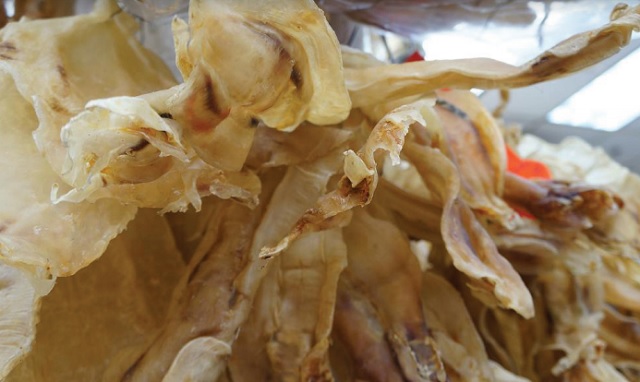
Ugandan traders battle Chinese, Indians, over lucrative business
Kampala, Uganda | ANDREW S. KAGGWA | A row has developed between the Ministry of Agriculture, Animal Industry and Fisheries (MAAIF) and fish exporters on one side and fish traders on the other over the sale of fish maws.
Siraje Walusimbi, an executive member of the Uganda Fishmaws Traders Association (UFTA), which brings together traders in fish maws, says the trade in maws is very lucrative.
“What we get from the sale of a fish maw is double or three times what we get from the fish itself,” he says.
Walusimbi explained that whereas the price for fish maws fluctuates with the dollar, a kilo goes for between Shs700,000 where a kilo of fish is bought at Shs7,000 at the factory. He says, however, to harvest a kilo of maws, one has to harvest them from several fish, especially if the fish are below 50kgs. But in some cases a fish weighing 50kgs and above, one can contain a fish maw weighing a kilogramme. This would mean the fish maw alone would go for Shs700,000 whereas the fish (at Shs7,000 per kilo would be bought at Shs350,000 at the factory.
Until now, the practice has been that when Nile Perch is caught, the maw is the property of the fish supplier. Some suppliers remove the fish maws before selling the fish. Even when the suppliers take the fish to factories, the arrangement is for the factory owners to give back the fish maws to the suppliers who in turn sell them to Chinese traders who export them mostly to China. The fish factories, on the other hand, are mostly owned by Asians and the fish is mostly supplied by Africans.
New directives on fish maws
But fish maw money now seems doomed after two stern directives from MAAIF regarding their sale.
First was a letter titled ‘Fishmaw handling and processing’ by the Director of Fisheries Resources, Dr. Edward Rukuunya to the Chairman, Uganda Fish Processors and Exporters and Association (UFPEA).
The letter dated December 12, 2017 and said the fish maws should only be sold to recognised and licensed fish maw processors and exporters. It also said fish maws should be bought by factories in the fish and not given back to the fish suppliers.
“This will enhance accuracy, transparency, and accountability in data gathering, food safety and overall increased contribution to the national economy,” Dr. Rukuunya’s letter reads in part.
A second letter dated January 10, 2018 from Pius Wakabi Kasajja, the Permanent Secretary MAAIF, prohibited the practice of ‘gutting fish at landing sites and other unauthorised places”. It was addressed to the Chief Administrative Officers (CAOs) of all districts in the country.
“It has come to the attention of the Directorate of Fisheries Resources that gutting of fish is rampant in many landing sites and unauthorised places. This act is detrimental and compromises the safety and quality of fish products and may render our fish unacceptable to key local, regional, and international markets,” the letter reads in part.
Quoting the Fish Act and The Fish Quality Assurance Rules, 2017, the letter instructed the CAOs to prevail over fisheries officers and inspectors in their areas of jurisdiction to ensure that this ‘illegal activity is stopped forthwith”.
It goes on to instruct the CAOs that should they find that some landing sites within their areas of jurisdiction are continuing with the practice, they should take stun measures which may include but not limited to closing the landing sites.
The letter was also copied to the head of the Fisheries Protection Force to carry out compliance enforcement.
But when the commander of the Fisheries Protection Force, Maj. James Nuwagaba, was contacted by The Independent on phone, he refused to confirm whether they had started enforcing that directive.
Following the two directives, on January 12, 2018 MAAIF invited what it had called a stakeholders meeting at the Kajjansi Agriculture Research and Development Centre. In this meeting it was only UFPEA, UFTA, AFALU; the Fisheries Protection Force who were invited.
 The Independent Uganda: You get the Truth we Pay the Price
The Independent Uganda: You get the Truth we Pay the Price





